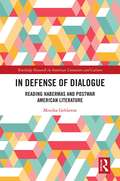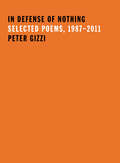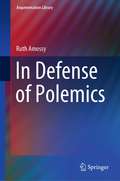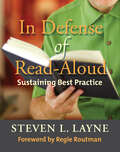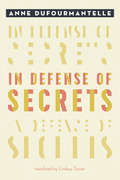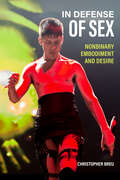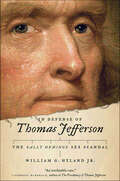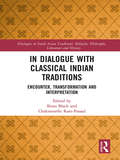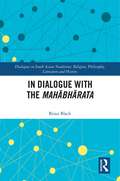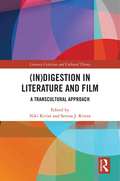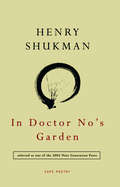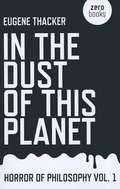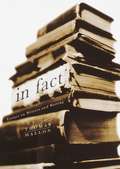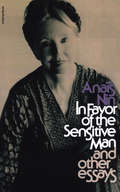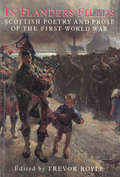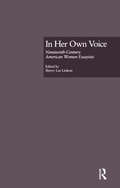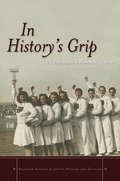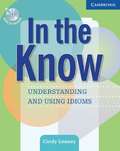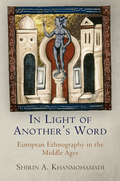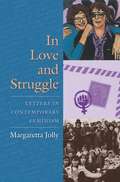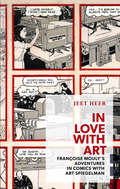- Table View
- List View
In Defense of Dialogue: Reading Habermas and Postwar American Literature (Routledge Research in American Literature and Culture)
by Monika GehlawatIn Defense of Dialogue: Reading Habermas and Postwar American Literature offers a timely investigation of the value of dialogue in contemporary American culture. Using Jürgen Habermas’s theory of communicative action to read the work of Frank O’Hara, James Baldwin, Grace Paley, and Andy Warhol, In Defense of Dialogue assembles postwar writers who have never been studied alongside one another, showing how they overcame the pervading skepticism of their contemporaries to imagine sincere and rational speakers who seek to cultivate intersubjective discourse.
In Defense of Nothing: Selected Poems, 1987–2011 (Wesleyan Poetry Series)
by Peter GizziA new lyricism for the twenty-first centuryRunner-up for the William Carlos Williams Award (2015) Since his celebrated first book of poetry, Peter Gizzi has been hailed as one of the most significant and distinctive voices writing today. Gathered from over five collections, and representing close to twenty-five years of work, the poems in this generous selection strike a dynamic balance of honesty, emotion, intellectual depth and otherworldly resonance—in Gizzi's work, poetry itself becomes a primary ground of human experience. Haunted, vibrant, and saturated with luminous detail, Gizzi's poetry enlists the American vernacular in a magical and complex music. In Defense of Nothing is an immensely valuable introduction to the work of this extraordinary and singular poet. Check for the online reader's companion at http://petergizzi.site.weleyan.edu.
In Defense of Polemics (Argumentation Library #42)
by Ruth AmossyThis book revisits the definition of polemical discourse and deals with its functions in the democratic sphere. It first examines theoretical questions concerning the management of disagreement in democracy and the nature of polemical discourse. Next, it analyses case studies involving such issues as the place of women in the public space, illustrated by the case of the burqa in France and public controversy in the media on the exclusion of women from the public space. The book then explores reason, passion and violence in polemical discourse by means of cases involving confrontations between secular and ultra-orthodox circles, controversies about the Mexican Wall and fierce discussions about stock-options, and bonuses in times of financial crisis.Although polemical exchanges in the public sphere exacerbate dissent instead of resolving conflicts, they are quite frequent in the media and on the Net. How can we explain such a paradox? Most studies in argumentation avoid the question: they mainly focus on the verbal procedures leading to agreement. This focus stems from the centrality conferred upon consensus in our democratic societies, where decisions should be the result of a process of deliberation. What is then the social function of a confrontational management of dissent that does not primarily seek to achieve agreement? Is it just a sign of decadence, failure and powerlessness, or does it play a constructive role? This book answers these questions.
In Defense of Read-Aloud: Sustaining Best Practice
by Steven LayneAs accountability measures for schools and teachers continue to grow, instructional practice is under the microscope. The practice of reading aloud to children may be viewed by some educators as an extra bit of fluff used solely for the purposes of enjoyment or filling a few spare minutes,but researchers and practitioners stand in solidarity: the practice of reading aloud throughout the grades is not only viable but also best practice.In Defense of Read-Aloud: Sustaining Best Practices, author Steven Layne reinforces readers' confidence to continue the practice of reading aloud and presents the research base to defend the practice in grades K12. Layne also offers significant practical insights to strengthen instructional practice-;answering the questions of Why should we?- and How should we? and provides practical advice about how to use read-alouds most effectively.Leading researchers in the field of literacy provide position statements, authors of professional books share insights on books they have loved, leaders of the largest literacy organizations in the United States write about their favorite read-alouds, award-winning authors of children's and young adult book (Katherine Paterson, Andrew Clements, Lois Lowry, to name a few) share the powerful behind-the-scenes stories of their greatest books, and real classroom teachers and librarians speak about books that have lit up- their classrooms and libraries around the world.Last but not least,In Defense of Read-Aloud features many great recommendations of books to share with children.Read-aloud is an essential practice in teaching literacy in grades K -12. In this book, Steven Layne has provided everything needed to support, sustain, and celebrate the power of read-aloud.
In Defense of Secrets
by Anne DufourmantelleIn an age that prizes political and personal transparency, In Defense of the Secret champions the secret as what permits relation and ensures our humanity.Psychoanalyst and philosopher Anne Dufourmantelle drowned in 2017 in an attempt to rescue two children caught in the ocean. Her work lives on, though, in this provocative and necessary book. Through etymologies and case studies, personal history and incisive commentary on contemporary society, In Defense of Secrets returns us to the fundamental psychic scene of the secret. The secret, for Dufourmantelle, is not a code to be cracked or a firewall to be penetrated but a dynamic and powerful entity that permits relation and that ensures our humanity.Tracking the secret though art and literature, philosophy, psychoanalysis, and sociology, from the Inquisition to the present, Dufourmantelle’s writing spirals around the question of the secret’s value. In our age, when political and personal transparency seem to be prized above all—lives posted on the Internet, information leaked, whistles blown, taboos absent except with respect to the secret itself—In Defense of Secrets champions what remains hidden, private, veiled, hushed, just out of sight. The secret is on the side of nature, not science; organic growth, not technology; love’s generosity, not knowledge’s grasp. For Dufourmantelle, the secret is a powerful and dynamic thing: deadly if unheard or misused, perhaps, but equally the source of creativity and of ethics. An ethics of the secret, we can hear her say, means listening hard and sensitively, respecting the secret in its secret essence, unafraid of it and open to what it has to say.
In Defense of Sex: Nonbinary Embodiment and Desire
by Christopher BreuExamines the need to recenter the category of sex–theorizing sex itself as nonbinary–in contemporary studies of gender and sexualityGender has largely replaced sex as a category in critical theory, in progressive cultural circles, and in everyday bureaucratic language. Much of this development has been salutary. Gender has become a crucial site for theorizing trans identifications and embodiments. Yet, without a concomitant theory of sex, gender’s contemporary uses also intersect with late neoliberalism’s emphasis on micro-identities, flexibility, avatar culture, and human capital. Contemporary culture has also grown more ambivalent about sexual desire and its expression. Sex is seen as both ubiquitous and ubiquitously a problem.In Defense of Sex theorizes sex as both a nonbinary form of embodiment (one that can complement recent trans conceptions of gender as multiple and nonbinary) and a crucial form of social desire. Drawing on intersex and trans theory as well as Marxist theory, feminist new materialism, psychoanalysis, and accounts of the flesh in Black studies, author Christopher Breu argues for a materialist understanding of embodiment and the workings of desire as they structure contemporary culture. Moving from critique to theorizing embodiment, desire, and forms of bioaccumulation, In Defense of Sex concludes by proposing the unabashedly utopian project of building a sexual and embodied commons.In Defense of Sex: Nonbinary Embodiment and Desire is available from Knowledge Unlatched on an open-access basis.
In Defense of Thomas Jefferson: The Sally Hemings Sex Scandal
by William G. Hyland Jr.The belief that Thomas Jefferson had an affair and fathered a child (or children) with slave Sally Hemings---and that such an allegation was proven by DNA testing—has become so pervasive in American popular culture that it is not only widely accepted but taught to students as historical fact. But as William G. Hyland Jr. demonstrates, this "fact" is nothing more than the accumulation of salacious rumors and irresponsible scholarship over the years, much of it inspired by political grudges, academic opportunism, and the trend of historical revisionism that seeks to drag the reputation of the Founding Fathers through the mud. In this startling and revelatory argument, Hyland shows not only that the evidence against Jefferson is lacking, but that in fact he is entirely innocent of the charge of having sexual relations with Hemings.Historians have the wrong Jefferson. Hyland, an experienced trial lawyer, presents the most reliable historical evidence while dissecting the unreliable, and in doing so he cuts through centuries of unsubstantiated charges. The author reminds us that the DNA tests identified Eston Hemings, Sally's youngest child, as being merely the descendant of a "Jefferson male." Randolph Jefferson, the president's wayward, younger brother with a reputation for socializing among the Monticello slaves, emerges as the most likely of several possible candidates. Meanwhile, the author traces the evolution of this rumor about Thomas Jefferson back to the allegation made by one James Callendar, a "drunken ruffian" who carried a grudge after unsuccessfully lobbying the president for a postmaster appointment---and who then openly bragged of ruining Jefferson's reputation. Hyland also delves into Hemings family oral histories that go against the popular rumor, as well as the ways in which the Jefferson rumors were advanced by less-than-historical dramas and by flawed scholarly research often shaped by political agendas. Reflecting both a layperson's curiosity and a lawyer's precision, Hyland definitively puts to rest the allegation of the thirty-eight-year liaison between Jefferson and Hemings. In doing so, he reclaims the nation's third president from the arena of Hollywood-style myth and melodrama and gives his readers a unique opportunity to serve as jurors on this enduringly fascinating episode in American history.
In Defense of Uncle Tom
by Brando Simeo Starkey"Uncle Tom" is the most piercing epithet blacks can hurl at one another. It marks targets as race traitors, and that painful stain is often permanent. Much more than a slur, Uncle Tom is a vital component of a system of social norms in the black community that deters treachery. In this book, Brando Simeo Starkey provocatively argues that blacks must police racial loyalty and that those successfully prosecuted must be punished with the label Uncle Tom. This book shadows Uncle Tom throughout history to understand how these norms were constructed, disseminated, applied, and enforced. Why were Martin Luther King Jr. , Marcus Garvey, Muhammad Ali, Jackie Robinson, Thurgood Marshall, and others accused of racial betrayal? In Defense of Uncle Tom answers this and other questions and insists that Uncle Tom is too valuable to discard. Because it deters treachery, this epithet helps build black solidarity, a golden tool in promoting racial progress.
In Dialogue with Classical Indian Traditions: Encounter, Transformation and Interpretation (Dialogues in South Asian Traditions: Religion, Philosophy, Literature and History)
by Brian Black Chakravarthi Ram-PrasadDialogue is a recurring and significant component of Indian religious and philosophical literature. Whether it be as a narrative account of a conversation between characters within a text, as an implied response or provocation towards an interlocutor outside the text, or as a hermeneutical lens through which commentators and modern audiences can engage with an ancient text, dialogue features prominently in many of the most foundational sources from classical India. Despite its ubiquity, there are very few studies that explore this important facet of Indian texts. This book redresses this imbalance by undertaking a close textual analysis of a range of religious and philosophical literature to highlight the many uses and functions of dialogue in the sources themselves and in subsequent interpretations. Using the themes of encounter, transformation and interpretation – all of which emerged from face-to-face discussions between the contributors of this volume – each chapter explores dialogue in its own context, thereby demonstrating the variety and pervasiveness of dialogue in different genres of the textual tradition. This is a rich and detailed study that offers a fresh and timely perspective on many of the most well-known and influential sources from classical India. As such, it will be of great use to scholars of religious studies, Asian studies, comparative literature and literary theory.
In Dialogue with the Mahābhārata (Dialogues in South Asian Traditions: Religion, Philosophy, Literature and History)
by Brian BlackThe Mahābhārata has been explored extensively as a work of mythology, epic poetry, and religious literature, but the text’s philosophical dimensions have largely been under-appreciated by Western scholars. This book explores the philosophical implications of the Mahābhārata by paying attention to the centrality of dialogue, both as the text’s prevailing literary expression and its organising structure. Focusing on five sets of dialogues about controversial moral problems in the central story, this book shows that philosophical deliberation is an integral part of the narrative. Black argues that by paying attention to how characters make arguments and how dialogues unfold, we can better appreciate the Mahābhārata’s philosophical significance and its potential contribution to debates in comparative philosophy today. This is a fresh perspective on the Mahābhārata that will be of great interest to any scholar working in religious studies, Indian/South Asian religions, comparative philosophy, and world literature.
: A Transcultural Approach (Literary Criticism and Cultural Theory)
by Niki Kiviat(In)digestion in Literature and Film: A Transcultural Approach is a collection of essays spanning diverse geographic areas such as Brazil, Eastern Europe, France, Ireland, Italy, Japan, Mexico, South Korea, Taiwan and the United States. Despite this geographic variance, they all question disordered eating practices represented in literary and filmic works. The collection ultimately redefines disorder, removing the pathology and stigma assigned to acts of non-normative eating. In so doing, the essays deem taboo practices of food consumption, rejection and avoidance as expressions of resistance and defiance in the face of restrictive sociocultural, political, and economic normativities. As a result, disorder no longer equates to "out of order", implying a sense of brokenness, but is instead envisioned as an act against the dominant of order of operations. The collection therefore shifts critical focus from the eater as the embodiment of disorder to the problematic norms that defines behaviors as such.
In Doctor No's Garden
by Henry ShukmanWith this assured and powerful first collection, Henry Shukman springs fully-formed into the poetry world, having already won a raft of prizes for individual poems. His sensibility is unique, engaging and immediate; we are drawn into the worlds of these poems by his accurate eye, his sensual line and the warmth of his communion with the scene he describes. Ranging across the globe, from Mexico to Japan, from the States to Southern England, these poems can be lyrical and deeply affecting, wryly funny or wildly imaginative. From a lonely mother attempting to learn the piano to a ski-jump that never ends, from a redemptive encounter with horses on a cold day to a miraculous bowl of chicken soup, these poems display a vibrancy and variety rarely seen in contemporary poetry. But Shukman's great strength is in the domestic: the complexities of love, and the rites of passage of childhood and parenthood, are re-entered with candor, grace and originality. In Doctor No's Garden is an affectionate, refreshing debut, striking in its imagery and insight, remarkable for its lightness of touch and emotional weight.
In The Dust of This Planet (Horror of Philosophy, volume #1)
by Eugene ThackerThe world is increasingly unthinkable, a world of planetary disasters, emerging pandemics, and the looming threat of extinction. In this book Eugene Thacker suggests that we look to the genre of horror as offering a way of thinking about the unthinkable world. To confront this idea is to confront the limit of our ability to understand the world in which we live - a central motif of the horror genre. In the Dust of This Planet explores these relationships between philosophy and horror. In Thacker's hands, philosophy is not academic logic-chopping; instead, it is the thought of the limit of all thought, especially as it dovetails into occultism, demonology, and mysticism. Likewise, Thacker takes horror to mean something beyond the focus on gore and scare tactics, but as the under-appreciated genre of supernatural horror in fiction, film, comics, and music.
In Fact: Essays on Writers and Writing
by Thomas MallonFrom the acclaimed novelist (Henry and Clara, Two Moons), essayist (A Book of One's Own), and critic (1998 National Book Critics Circle Citation for Excellence in Reviewing)--an engaging new collection of essays.In Fact gathers the best of Thomas Mallon's superb criticism from the past twenty-two years--essays that appeared in his GQ column, "Doubting Thomas," and in The New York Times Book Review, The American Scholar, The New Yorker, and Harper's, among other publications. Here are his evaluations of the work of contemporary writers such as Nicholson Baker, Peter Carey, Tom Wolfe, Do DeLillo, Joan Didion, and Robert Stone, and reassessments of such earlier twentieth-century figures as John O'Hara, Sinclair Lewis, Truman Capote, and Mary McCarthy. Mallon also considers an array of odd literary genres and phenomena--including book indexes, obituaries, plagiarism, cancelled checks, fan mail, and author tours. And he turns his sharp eye on historical fiction (his own genre) as well as on the history, practice, and future of memoir.Smart, unorthodox, and impassioned, this collection is an integral piece of an important literary career and an altogether marvelous read.From the Hardcover edition.
In Favor of the Sensitive Man: And Other Essays
by Anaïs NinEssays, lectures, and interviews—on everything from gender relations to Ingmar Bergman to adventure travel—from the renowned diarist. In this collection, the author known for &“one of the most remarkable diaries in the history of letters&” shares her unique perceptions of people, places, and the arts (Los Angeles Times). In the opening group of essays, &“Women and Men,&” Anaïs Nin provides the kind of sensitive insights into the feminine psyche and relations between the sexes that are a hallmark of her work. In &“Writing, Music, and Films,&” she speaks as an artist and critic—in book and film reviews, an essay on the composer Edgard Varèse, a lecture on Ingmar Bergman, and the story of her printing press. In the final section, &“Enchanted Places,&” Nin records her travels to such destinations as Fez and Agadir in Morocco, Bali, the New Hebrides, and New Caledonia—and she concludes with a charming vignette titled &“My Turkish Grandmother.&”
In Flanders Fields: Scottish Poetry and Prose of the First World War
by Trevor RoyleThis anthology is the first ever acknowledgement of Scotland's unique contribution to the literature of the First World War. Here are gathered together well-known writers like John Buchan, Eric Linklater, Hugh MacDiarmid and Compton Mackenzie, as well as poets like Joseph Lee and Roderick Watson Kerr, who found their true voices fighting in a war to end wars. There is also a substantial contribution from women writers in the work of Violet Jacob, Naomi Mitchison and Mary Symon.
In Gratitude for All the Gifts
by Magdalena KayIn Gratitude for All the Gifts explores the literary and cultural links between the bestselling, Nobel Prize-winning Northern Irish poet Seamus Heaney and the preeminent Eastern European poets of the twentieth century, including fellow Nobel laureate Czeslaw Milosz and Zbigniew Herbert. Magdalena Kay opens new ground in comparative literary studies with her close analysis of Heaney's poetic work from the perspective of the English-speaking West's attraction, and especially Heane''s own attraction, to Eastern European poetry.While placing Milosz and Herbert in their cultural contexts and keeping an eye on the poems in their original Polish, this innovative and energetic study focuses on how Heaney encountered their work in translation. In Gratitude for All the Gifts thus allows us to see what happens when poetic forms, histories, and themes travel between countries and encourages us to understand cultural crossing not just thematically, but also in terms of form, voice, and aesthetic intent.
In Her Own Voice: Nineteenth-Century American Women Essayists (Gender and Genre in Literature)
by Sherry L. LinkonFirst published in 1998. Routledge is an imprint of Taylor & Francis, an informa company. In Her Own Voice examines the literary history of women’s nonfiction writing through studies of individual writers, their works, and their careers. The essays in this collection consider the development of women’s public voices, relationships between women essayists and their editors and readers, and the fuzzy line that divides—or seems to divide—fiction from nonfiction. The book includes studies of some of the best known American women essayists, including Margaret Fuller, Lydia Maria Child, and Fanny Fern, and articles on women writers whose work has received very little attention, such as Gail Hamilton, Anna Julia Cooper, Ann Sophia Stephens, and Zitkala-Sa.
In History's Grip: Philip Roth's Newark Trilogy
by Michael KimmageIn History's Gripconcentrates on the literature of Philip Roth, one of America's greatest writers, and in particular onAmerican Pastoral,I Married a Communist, andThe Human Stain. Each of these novels from the 1990s uses Newark, New Jersey, to explore American history and character. Each features a protagonist who grows up in and then leaves Newark, after which he is undone by a historically generated crisis. The city's twentieth-century decline from immigrant metropolis to postindustrial disaster completes the motif of history and its terrifying power over individual destiny. In History's Gripis the first critical study to foreground the city of Newark as the source of Roth's inspiration, and to scrutinize a subject Roth was accused of avoiding as a younger writer-history. In so doing, the book brings together the two halves of Roth's decades-long career: the first featuring characters who live outside of history's grip; the second, characters entrapped in historical patterns beyond their ken and control.
In Joy Still Felt: The Autobiography of Isaac Asimov, 1954-1978
by Isaac AsimovAsimov wrote a two volume autobiography, of which this is volume II.
In The Know: Understanding And Using Idioms
by Cindy LeaneyIn the Know teaches over 800 colorful idioms in English. The book groups the idioms into units depending on whether the idioms relate to such concepts as danger or honesty, or whether they contain colors or parts of the body, etc. Each unit has a clear four-page format that presents the idioms, explores their meaning, and practices their use.
In Light of Another's Word
by Shirin A. KhanmohamadiChallenging the traditional conception of medieval Europe as insular and even xenophobic, Shirin A. Khanmohamadi's In Light of Another's Word looks to early ethnographic writers who were surprisingly aware of their own otherness, especially when faced with the far-flung peoples and cultures they meant to describe. These authors--William of Rubruck among the Mongols, "John Mandeville" cataloguing the world's diverse wonders, Geraldus Cambrensis describing the manners of the twelfth-century Welsh, and Jean de Joinville in his account of the various Saracens encountered on the Seventh Crusade--display an uncanny ability to see and understand from the perspective of the very strangers who are their subjects.Khanmohamadi elaborates on a distinctive late medieval ethnographic poetics marked by both a profound openness to alternative perspectives and voices and a sense of the formidable threat of such openness to Europe's governing religious and cultural orthodoxies. That we can hear the voices of medieval Europe's others in these narratives in spite of such orthodoxies allows us to take full measure of the productive forces of disorientation and destabilization at work on these early ethnographic writers.Poised at the intersection of medieval studies, anthropology, and visual culture, In Light of Another's Word is an innovative departure from each, extending existing studies of medieval travel writing into the realm of poetics, of ethnographic form into the premodern realm, and of early visual culture into the realm of ethnographic encounter.
In Love and Struggle: Letters in Contemporary Feminism (Gender and Culture Series)
by Margaretta JollyWinner of the 2009 Feminist and Women's Studies Association Book PrizeDo you think I can be a feminist mother? Did I make you and your kisses up in my mind? Will you join our military protest at the gate? Will you feed the kids when I'm in prison? Are you able to forgive me for breaking off this correspondence because you are a man?During the women's movement of the 1970s and 1980s, feminists in the United States and Britain reinvented the image of the woman letter writer. Symbolically tearing up the love letter to an absent man, they wrote passionate letters to one another, exploring questions of sexuality, separatism, and strategy. These texts speak of the new interest women began to feel in one another and the new demands-and disappointments-these relationships would create. Margaretta Jolly provides the first cultural study of these letters, charting the evolution of feminist political consciousness from the height of the women's movement to today's e-mail networks. Jolly uncovers the passionate, contradictory emotions of both politics and letter writing and sets out the theory behind them as a fragile yet persistent ideal of care ethics, women's love, and epistolary art. She follows several compelling feminist relationships sustained through writing and confronts the mixed messages of the "open letter," which complicated political relations between women (such as Audre Lorde's "Open Letter to Mary Daly," which called out white feminists for their implicit racism).Jolly recovers the unsung literature of lesbianism and feminist romance, examines the ambivalent feelings within mother-daughter correspondences, and considers letter-writing campaigns during the peace movement. She concludes with a discussion of the ethical dilemma surrounding care versus autonomy and the meaning behind the burning or saving of letters. Letters that chart love stories, letters stowed away in attics, letters burnt at the end of romances, bittersweet letters written but never sent... this fascinating glimpse into women's intimate archives illuminates one of feminism's central concerns-that all relationships are political-and uniquely recasts a social movement in very emotional terms.
In Love and Struggle: Letters in Contemporary Feminism
by Margaretta JollyMargaretta Jolly provides the first cultural study of women's letters during the 1970s and 1980s, tracing the evolution of feminist political consciousness from the height of the women's movement to today's global networks. Jolly makes sense of the contradictory emotions of letter writing and captures a fragile yet persistent ideal of care, women's love, and epistolary art. From lesbian love letters to dispatches from women's encampments at Greenham Common and the Fourth World Conference on Women in Beijing, from letters exchanged between mothers and daughters to the spread of feminist internet communities, Jolly provides a fascinating glimpse into the intimate archives of contemporary women.
In Love with Art: Françoise Mouly's Adventures in Comics with Art Spiegelman (Exploded Views)
by Jeet HeerIn a partnership spanning four decades, Francoise Mouly and Art Spiegelman have been the pre-eminent power couple of cutting-edge graphic art. From Raw magazine to the New York, where she serves as art editor, Mouly and Spiegelman have revolutionized the art. In Love with Art profiles the pair and interviews Chris Ware, Dan Clowes, Adrian Tomine and more.
